安徽省安庆市第九中学高二英语《Unit 7 The Sea》教案(北师大版必修三)
北师大版教案Unit 7 The sea Lesson 2 Protecting the sea
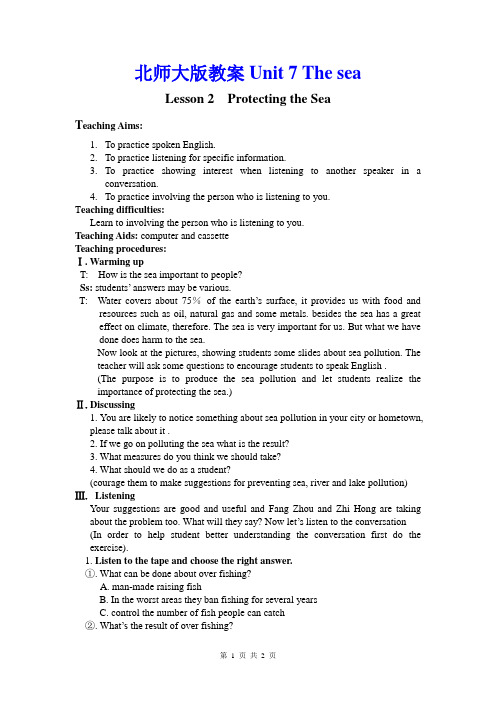
北师大版教案Unit 7 The seaLesson 2 Protecting the SeaT eaching Aims:1.To practice spoken English.2.To practice listening for specific information.3.To practice showing interest when listening to another speaker in aconversation.4.To practice involving the person who is listening to you.T eaching difficulties:Learn to involving the person who is listening to you.Teaching Aids: computer and cassetteTeaching procedures:Ⅰ. Warming upT: How is the sea important to people?Ss: students’ answers may be various.T: Water covers about 75%of the earth’s surface, it provides us with food and resources such as oil, natural gas and some metals. besides the sea has a great effect on climate, therefore. The sea is very important for us. But what we have done does harm to the sea.Now look at the pictures, showing students some slides about sea pollution. The teacher will ask some questions to encourage students to speak English .(The purpose is to produce the sea pollution and let students realize the importance of protecting the sea.)Ⅱ.Discussing1. You are likely to notice something about sea pollution in your city or hometown,please talk about it .2. If we go on polluting the sea what is the result?3. What measures do you think we should take?4. What should we do as a student?(courage them to make suggestions for preventing sea, river and lake pollution) Ⅲ. ListeningYour suggestions are good and useful and Fang Zhou and Zhi Hong are taking about the problem too. What will they say? Now let’s listen to the conversation (In order to help student better understanding the conversation first do the exercise).1. Listen to the tape and choose the right answer.①. What can be done about over fishing?A. man-made raising fishB. In the worst areas they ban fishing for several yearsC. control the number of fish people can catch②. What’s the result of over fishing?A. there are less fish to catchB. people can fish too muchC. They can catch more fish than before by better technology③. What are some government departments doing about sea pollution?A. punishing people who keep a record of levels of populationB. thinking of ways to reduce populationC. all departments must be responsible for finding where pollution comes from. (answers : ①. C ②. A ③. B )2. Listen to the tape again and fill in the tape.(The teacher design the exercise is to reduce the difficulty in next exercise )①. That’s when people fish too much and the number of fish falls too low. Some fish may disappear altogether.②. So there are more fisherman catching more fish?Well, they hope to catch more fish, but there are less fish to catch, so they simply can’t.③. They also try to help people to get other kinds of jobs, so there are less people trying to make a living from fishing.④. It mostly comes from industrial waste from factories and agricultural waste from farming.3. Listen to the interview again and answer the questions①.What is the problem 1?②. What is the problem 2?③. What are the reasons for problem 2?④. What are the causes of problem1?⑤. What are the solutions to problem 1?⑥. What are the solutions to problem 2?Ⅳ.Writing and speaking :Do exercise 5, 6, 7 to show interest and keep a conversation going. Read through the example dialogue then make up a new one with your partner.(The purpose is to practice showing interest when listening to another speaker in a conversation and involving the person who is listening to you.)Ⅴ. HomeworkPractise using the useful words about protecting the sea by making sentences with them:sea animals, water sports, history of sea travel, ports,sea fishing, science and the sea。
北师大版高中英语必修三-Unit7-the-sea-语法篇(教师版)
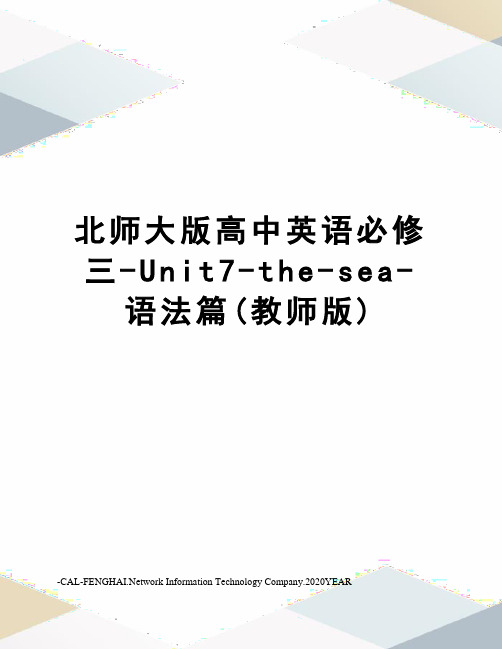
北师大版高中英语必修三-U n i t7-t h e-s e a-语法篇(教师版)work Information Technology Company.2020YEARUnit7 the sea-语法篇_____________________________________________________________________ _______________________________________________________________________________ __________1、理解、掌握、运用限制性和非限制性定语从句。
2、理解、掌握、运用where,when,why与“介词+which”引导的定语从句。
3、理解、掌握、运用形容词和副词的比较。
4、理解、掌握、运用状态和动作动词。
一、课时重点1. 关系副词where和when引导的定语从句可以提供时间和地点方面的信息。
例如:This is the place where I lost my purse.She still remember the day when Bill first walked into her office. 2. 在reason后可用why引导定语从句。
例如:Do you know the reason why he was so angryIs there any reason why he is fired3. 介词+which/whom引导的定语从句。
关系代词可作介词的宾语。
通常在which和whom前加介词,即介词+which/whom结构。
例如:The train on which I am travelling is for Shanghai.This is the professor from whom I've learned a lot.注意:在日常英语中,通常是把介词放在从句的句末,省略关系代词which和whom。
(完整版)Unit7TheSea教案
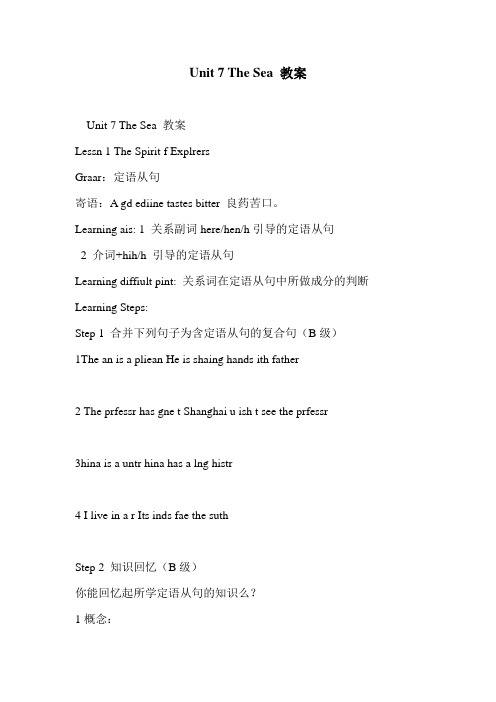
Unit 7 The Sea 教案Unit 7 The Sea 教案Lessn 1 The Spirit f ExplrersGraar:定语从句寄语:A gd ediine tastes bitter 良药苦口。
Learning ais: 1 关系副词here/hen/h引导的定语从句2 介词+hih/h 引导的定语从句Learning diffiult pint: 关系词在定语从句中所做成分的判断Learning Steps:Step 1 合并下列句子为含定语从句的复合句(B级)1The an is a pliean He is shaing hands ith father2 The prfessr has gne t Shanghai u ish t see the prfessr3hina is a untr hina has a lng histr4 I live in a r Its inds fae the suthStep 2 知识回忆(B级)你能回忆起所学定语从句的知识么?1概念:2定语从句由引导,修饰前面的词,并在句中做语。
我们上学期学习了关系代词_______ _________ ________ _______________引导的定语从句。
3划出以下句子的定语从句,关系词,先行词,并且在句中所做的成分。
The taled abut the en and the things that the saStep 3 定语从句(1)(B级)这一时我们将学习关系副词hen, here, h 引导的定语从句:1hen 在定语从句中表时间,作状语,其先行词往往是表示时间的名词,如:tie, da, seasn, age, asin 等。
I an’t frget the night hen I ae t the far翻译:1here 在定语从句中表示地点,作状语,其先行词通常是表示地点的名词。
高中英语 Unit 7 lesson2《The Sea protecting the sea》教案2 北师大版必修3

Unit 7 The SeaLesson 2 Protecting the Sea教案Teaching Aims:1.To practice spoken English.2.To practice listening for specific information.3.To practice showing interest when listening to another speaker in a conversation.4.To practice involving the person who is listening to you.T eaching difficulties:Learn to involving the person who is listening to you.Teaching Aids: computer and cassetteTeaching procedures:Ⅰ. Warming upT: How is the sea important to people?Ss: students’ answers may be various.T: Water covers about 75%of the earth’s surface, it provides us with food and resources such as oil, natural gas and some metals. Besides the sea has a great effect on climate, therefore.The sea is very important for us. But what we have done does harm to the sea.Now look at the pictures, showing students some slides about sea pollution. The teacher will ask some questions to encourage students to speak English.(The purpose is to produce the sea pollution and let students realize the importance of protecting the sea.)Ⅱ.Discussing1. You are likely to notice something about sea pollution in your city or hometown, pleasetalk about it.2. If we go on polluting the sea what is the result?3. What measures do you think we should take?4. What should we do as a student?(Courage them to make suggestions for preventing sea, river and lake pollution)Ⅲ. ListeningYour suggestions are good and useful and Fang Zhou and Zhi Hong are taking about the problem too. What will they say? Now let’s listen to the conversation(In order to help student better understanding the conversation first do the exercise).1. Listen to the tape and choose the right answer.①. What can be done about over fishing?A. man-made raising fishB. In the worst areas they ban fishing for several yearsC. control the number of fish people can catch②. What’s the result of over fishing?A. there are less fish to catchB. people can fish too muchC. They can catch more fish than before by better technology③. What are some government departments doing about sea pollution?A. punishing people who keep a record of levels of populationB. thinking of ways to reduce populationC. all departments must be responsible for finding where pollution comes from.(answers : ①. C ②. A ③. B )2. Listen to the tape again and fill in the tape.(The teacher design the exercise is to reducethe difficulty in next exercise )①. That’s when people fish too much and the number of fish falls too low. Some fish may disappearaltogether.②. So there are more fisherman catching more fish?Well, they hope to catch more fish, but there are less fish to catch, so they simply can’t.③. They also try to help people to get other kinds of jobs, so there are less people tryingto make a living from fishing.④. It mostly comes from industrial waste from factories and agricultural waste from farming.3. Listen to the interview again and answer the questions①.What is the problem 1?②. What is the problem 2?③. What are the reasons for problem 2?④. What are the causes of problem1?⑤. What are the solutions to problem 1?⑥. What are the solutions to problem 2?Ⅳ.Writing and speaking :Do exercise 5, 6, 7 to show interest and keep a conversation going. Read through the example dialogue then make up a new one with your partner.(The purpose is to practice showing interest when listening to another speaker in a conversation and involving the person who is listening to you.)Ⅴ. HomeworkPractise using the useful words about protecting the sea by making sentences with them: protect, pollute, pollution, waste, deal with, be responsible for, break the law, punish, keep a record of , control, communicate.。
高二英语Unit7TheseaWorld教案
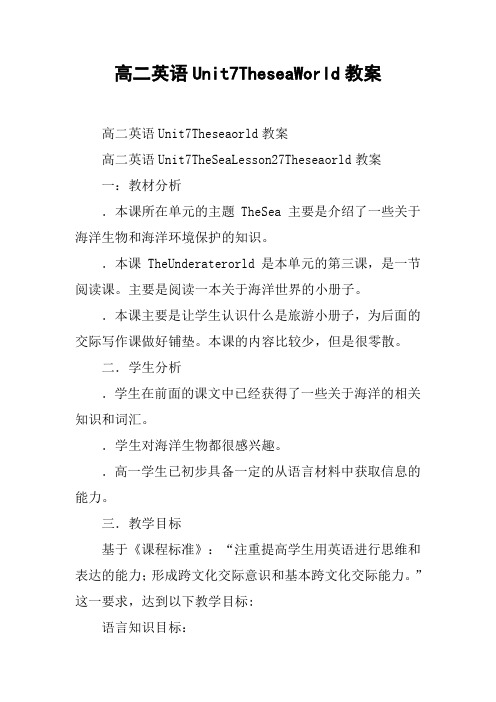
高二英语Unit7TheseaWorld教案高二英语Unit7Theseaorld教案高二英语Unit7TheSeaLesson27Theseaorld教案一:教材分析.本课所在单元的主题TheSea主要是介绍了一些关于海洋生物和海洋环境保护的知识。
.本课TheUnderaterorld是本单元的第三课,是一节阅读课。
主要是阅读一本关于海洋世界的小册子。
.本课主要是让学生认识什么是旅游小册子,为后面的交际写作课做好铺垫。
本课的内容比较少,但是很零散。
二.学生分析.学生在前面的课文中已经获得了一些关于海洋的相关知识和词汇。
.学生对海洋生物都很感兴趣。
.高一学生已初步具备一定的从语言材料中获取信息的能力。
三.教学目标基于《课程标准》:“注重提高学生用英语进行思维和表达的能力;形成跨文化交际意识和基本跨文化交际能力。
”这一要求,达到以下教学目标:语言知识目标:a.使学生掌握关于海洋生物的单词。
penguinsharcoralpolarbearacrobaticsealcrabdolphinic ebergb.掌握旅游小册子的基本结构语言技能目标:a.使学生能从语言材料中获取重要的信息。
b.使学生能够将所获得的信息用自己的语言表达出来。
c.使学生能够利用所学知识将课文知识变成对话。
情感态度目标:a.培养学生对大自然,对海洋的兴趣。
b.提高学生的环保意识。
学习策略目标a.训练学生略读和精读的能力b.培养学生用英语交流的能力。
c.培养学生重组知识的能力。
文化意识目标使学生会用英语介绍一个海洋世界的基本情况,从而提高学生的跨文化交际能力。
三.教学思路由于这篇课文内容比较零散,如果按照课文所设计的步骤来上的话会比较枯燥,无法引起学生的兴趣。
所以我决定以用情景教学的方法来组织这节课。
首先通过介绍几个新朋友即奥运吉祥物福娃给学生,然后以福娃想参观海洋世界,但又苦于没有导游为主线来组织课堂。
让学生当导游,然后一步步把阅读练习贯穿于每一个活动中。
北师大版高一年级下册unit7《the sea》优秀教案(重点资料).doc
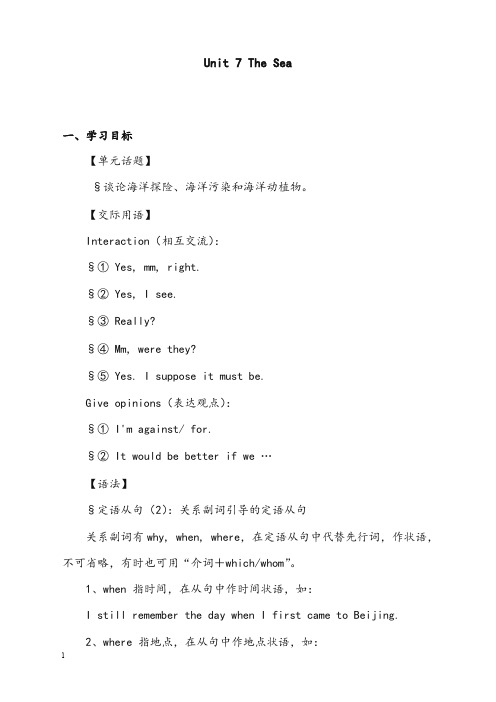
Unit 7 The Sea一、学习目标【单元话题】§谈论海洋探险、海洋污染和海洋动植物。
【交际用语】Interaction(相互交流):§① Yes, mm, right.§② Yes, I see.§③ Really?§④ Mm, were they?§⑤ Yes. I suppose it must be.Give opinions(表达观点):§① I'm against/ for.§② It would be better if we …【语法】§定语从句(2):关系副词引导的定语从句关系副词有why, when, where,在定语从句中代替先行词,作状语,不可省略,有时也可用“介词+which/whom”。
1、when 指时间,在从句中作时间状语,如:I still remember the day when I first came to Beijing.2、where 指地点,在从句中作地点状语,如:This is the house3、why 指原因,在从句中作原因状语,如:There are several reasons why we can't do that.“介词+关系代词”引导的定语从句是定语从句中较复杂的一种,一般多用于正式用语中,既可引导限制性定语从句,又可引导非限制性定语从句。
学习这种定语从句要注意介词的选择,要根据介词和从句中谓语动词的习惯搭配,如:Who is the man with whom you just shook hands?The two things about which Karl Marx was not sure were the grammar and some of the idioms.【重要词组】force sb. to do sth.persuade sb. to do sth.know…asfind oneself …follow sb.'s directionsaccording to…in search ofkeep a record ofpick upmore thanin the direction of…【写作】§能运用段落安排策略,用英语写出100词左右的报告,介绍一个旅游景点。
[推荐精选]Unit 7 The Sea 上课学习上课学习教案
![[推荐精选]Unit 7 The Sea 上课学习上课学习教案](https://img.taocdn.com/s3/m/cb2e8feca58da0116c174932.png)
Unit 7 The Sea 教案Unit7TheSea教案Lesson1TheSpiritofExplorersGrammar:定语从句寄语:Agoodmedicinetastesbitter.良药苦口。
Learningaims:1.关系副词where/when/why引导的定语从句2.介词+which/whom引导的定语从句Learningdifficultpoint:关系词在定语从句中所做成分的判断LearningSteps:Step1合并下列句子为含定语从句的复合句(B级).Themanisapoliceman.Heisshakinghandswithmyfather.2.TheprofessorhasgonetoShanghai.youwishtoseetheprof essor.3.chinaisacountry.chinahasalonghistory.4.Iliveinaroom.Itswindowsfacethesouth.Step2知识回忆(B级)你能回忆起所学定语从句的知识么?.概念:2.定语从句由引导,修饰前面的词,并在句中做语。
我们上学期学习了关系代词_______________________________________引导的定语从句。
3.划出以下句子的定语从句,关系词,先行词,并且在句中所做的成分。
Theytalkedaboutthemenandthethingsthattheysaw.Step3定语从句(1)(B级)这一课时我们将学习关系副词when,where,why引导的定语从句:.when在定语从句中表时间,作状语,其先行词往往是表示时间的名词,如:time,day,season,age,occasion等。
Ican’tforgetthenightwhenIcametothefarm.翻译:.where在定语从句中表示地点,作状语,其先行词通常是表示地点的名词。
Unit7TheSea教案(可编辑修改word版)
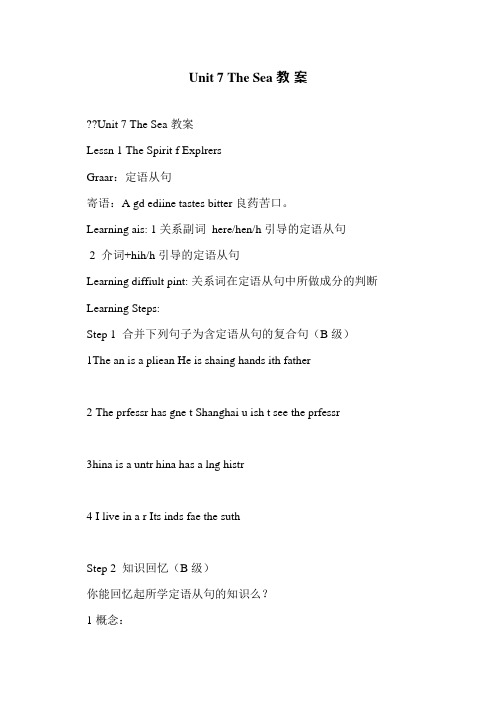
Unit 7 The Sea 教案??Unit 7 The Sea 教案Lessn 1 The Spirit f ExplrersGraar:定语从句寄语:A gd ediine tastes bitter 良药苦口。
Learning ais: 1 关系副词here/hen/h 引导的定语从句2 介词+hih/h 引导的定语从句Learning diffiult pint: 关系词在定语从句中所做成分的判断Learning Steps:Step 1 合并下列句子为含定语从句的复合句(B 级)1The an is a pliean He is shaing hands ith father2 The prfessr has gne t Shanghai u ish t see the prfessr3hina is a untr hina has a lng histr4 I live in a r Its inds fae the suthStep 2 知识回忆(B 级)你能回忆起所学定语从句的知识么?1 概念:2 定语从句由引导,修饰前面的词,并在句中做语。
我们上学期学习了关系代词引导的定语从句。
3 划出以下句子的定语从句,关系词,先行词,并且在句中所做的成分。
The taled abut the en and the things that the saStep 3 定语从句(1)(B 级)这一时我们将学习关系副词hen, here, h 引导的定语从句:1hen 在定语从句中表时间,作状语,其先行词往往是表示时间的名词,如:tie, da, seasn, age, asin 等。
I an’t frget the night hen I ae t the far翻译:1here 在定语从句中表示地点,作状语,其先行词通常是表示地点的名词。
如plae, situatin, it, tn, fatr, ase, 等。
(教师用书)高中英语 Unit 7 The sea教案 北师大版必修3
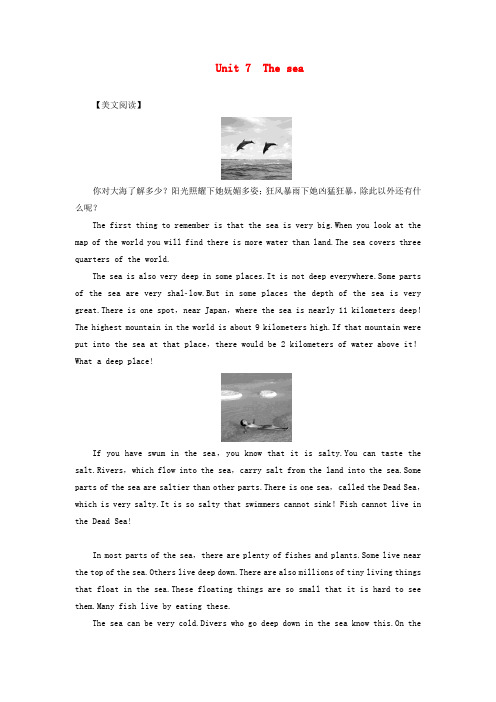
Unit 7 The sea【美文阅读】你对大海了解多少?阳光照耀下她妩媚多姿;狂风暴雨下她凶猛狂暴,除此以外还有什么呢?The first thing to remember is that the sea is very big.When you look at the map of the world you will find there is more water than land.The sea covers three quarters of the world.The sea is also very deep in some places.It is not deep everywhere.Some parts of the sea are very shallow.But in some places the depth of the sea is very great.There is one spot,near Japan,where the sea is nearly 11 kilometers deep!The highest mountain in the world is about 9 kilometers high.If that mountain were put into the sea at that place,there would be 2 kilometers of water above it!What a deep place!If you have swum in the sea,you know that it is salty.You can taste the salt.Rivers,which flow into the sea,carry salt from the land into the sea.Some parts of the sea are saltier than other parts.There is one sea,called the Dead Sea,which is very salty.It is so salty that swimmers cannot sink!Fish cannot live in the Dead Sea!In most parts of the sea,there are plenty of fishes and plants.Some live near the top of the sea.Others live deep down.There are also millions of tiny living things that float in the sea.These floating things are so small that it is hard to see them.Many fish live by eating these.The sea can be very cold.Divers who go deep down in the sea know this.On thetop the water may be warm.When the diver goes downwards,the sea becomes colder and colder.Another thing happens.When the diver goes deeper,the water above presses down on him.It squeezes (挤)him.Then the diver has to wear clothes made of metal.But he cannot go very deep.Some people who wanted to go very deep used a very strong diving ship!They went down to the deepest part of the sea in it.They went down to a depth of eleven kilometers!【诱思导学】1.Why does the author mention the sea somewhere near Japan?2.Are there any fishes living in the Dead Sea?3.Why can't people go very deep in the sea?【答案】 1.To show that the sea in some places is very deep.2.No ,there aren't.3.Because the pressure of the water at great depths is great.Period ⅠPreviewing(教师用书独具)●课标解读本课时主要是通过学生对学案所给内容的学习,了解下一课时即将出现的词汇,初步了解课文以及相关的背景知识,将对下一节课内容的全面理解起到了铺垫作用。
Unit 7《The Sea》说课稿(北师大版必修3)

Unit 7 The Sea 说课稿Good morning! Ladies and Gentlemen:Today I’m very pleased to have an opportunity to talk about some of my teaching ideas. My topic is life in the oceans taken from Lesson 63 of Unit 16 in SEFC(2).Here is my teaching design demonstration. It is made up of four parts.Part 1 My understanding of this lessonThe analysis of the teaching material:This lesson is a reading passage. It plays a very important part in the English teaching of this unit. By studying of this Lesson, Ss can improve their reading ability, learn more about the sea and the life in the oceans. At the same time, we should get the students to understand some difficult sentences to comprehend the passage better. The Ss should do some listening, speaking and writing, too. Of course, the Ss should receive some moral education. Let the Ss understand the sea better, love the sea and save the sea and the life of the sea.Teaching aims: 1. Knowledge aim: Understand the main idea of the text. 2. Ability aim: Retell the text in their own words.3. Emotional aim: Make the Ss love the life of the sea and do something to stop it being polluted.Key points / Teaching important points: How to understand the text better.Teaching difficult points: 1. Use your own words to retell the text.2. Discuss the pollution of the sea and how to save the sea.Something about the Ss:1. The Ss have known something about the sea and sea life through the Internet and other ways.2. They are lack of vocabulary.3. They don’t often use English to express th emselves and communicate with others.4. Some Ss are not active in the class because they are afraid of making mistakes.Part 2 My teaching theories, methods and aidsBefore dealing with this lesson, I’ll do my best to carry out the following theories: Make the Ss the real masters in class while the teacher himself acts as director;Combine the language structures with the language functions; Let the students receive some moral education while they are learning the English language.Teaching method: Double activities teaching method Question-and-answer activity teaching methodWatch-and-listen activity Free discussion method Pair work or individual work methodTeaching aids: 1. a projector 2. a tape recorder 3. multimedia 4. the blackboardPart 3. Teaching steps / proceduresI have designed the following steps to train their ability of listening, speaking, reading and writing, especially reading ability.The entire steps are: Greetings, Revision, Lead-in and preparation for reading, Fast reading (scanning), Listening, Intensive reading, Preparation for details of the text,Consolidation, Discussion, HomeworkStep 1 Greetings Greet the whole class as usual.Step 2. Revision1. Ask students some questions to revise the last lesson(show them on the screen).a. How much salt do the oceans contain per thousand parts of water?(35 parts of salt. 3.5% by weight)b. What is coral? Why are corals not found in deep water?c. Why is the Dead Sea called the Dead Sea?2. Check the homework(made a survey about the sea or sea life by surfing the Internet or asking for help from other people). Through this part we can consolidate what they studied yesterday, communicate with others about their survery results and prepare for the new lesson.Step 3. Lead-in and preparation for readingShow them some pictures and let them talk each other, and then use the pictures about sea and life in the oceans to learn new words, for example, Antarctica, huge whale, sperm whale, squid and so on.Purpose: Arouse the students’ interest of s tudy.Bring in new subject: Life in the oceans.Step 4. Fast readingRead the passage as quickly as they can. I show the questions on the screen and let them get the main idea of each paragraph: 1. Why can living things live in such oceans around the Antarctica?2. What does the whale feed on?3. What is the difference between the sperm whale and other whales?Method: Read the text individually, use question—and—answer activity.Purpose: Improve the students’ reading ability.Understand the general idea of each paragraph.Step 5. Listening(book closed)1. Listen to the tape then do an exercise(wb page 90, part 1)2. True or false exercise.(on the screen)Train the Ss’ listening ability and prepare for later exercises.Step 6. Intensive reading Read the passage carefully again and answer some detailed questions on the screen.1. How much does a whale eat at a time?2. Do all the whales feed on small fish?3. How deep can a sperm whale dive?It is also called depth reading or study reading. It means reading for detailed information. Purpose: Further understand the text (Train further reading abilityto find out some different sentences and details of the text.Step 7. Preparation for details of the text on the screen1. ...its heart slows to half its normal speed. slow-v. to become / make slower.2. ing sound wave Present participle used as adverbial.3. provide sth. for sb. provide sb. with sth.4. at a time: each time5. grow to a length of... Purpose: Train the Ss’ ability of understanding and using laguage.Step 8. Consolidation1. Find out the topic sentences.2. Retell the passage according to the topic sentences.Purpose: I want to know if my students understand the whole text really and if they master what I mean to tell them in this class. What’s more, I want to let them have the ability of introducing and analyzing expression. At the same time, I will write down the topic sentences on the blackboardaccording to what the students find, so they can retell it easily.Step 9. Discussion Show them some pictures about the polluted sea and many living things which are in danger and ask them: What are their opinions about it? In order to let them have free choice, I give them another topic: The sea is being polluted. What should they do?Purpose: I mean to give them emotional education. I give them multi-media pictures to arouse their interest of study and their love for life. I mean to make them realize: The sea is in danger! I teach them to do their best to help it and do something from now on. Everyone should do something to love and protect our home.Step 10. Homework Write an article Saving the sea. I want to improve the ability of their writing. At the same time, train the ability of do-it-yourself and looking upthe information by themseleves.That’s all about my teaching, and during my teaching, I will try my best to make the class alive and encourage the students to speak more, act more and keep smiling and praising them. I think that I will arouse their interest in studying English.Thanks very much!。
高中英语Unit7TheSea单元小结教案含解析北师大必修30605143.doc

Unit 7 The SeaThere were once lived some sailors in a village near the sea, who made a living by fishing. Since their ancestors were explorers, they all inherited the spirit of adventure.Because of overfishing and industrial and agricultural pollution from chemicals, there were fewer and fewer fishes in the coastal waters. So they had to travel further in search of more fishes.One day, they set sail for deepsea fishing. Before their journey, they had a debate about where to go. Since Jack was the oldest of them, everything was done according to his instructions. Jack, though in his forties, was intelligent and energetic. He persuaded others to make a voyage of adventure.After a day's voyage, they eventually reached an unknown area they had never been to before. They were trying to recognise where they were. All at once, a man screamed with terror “Watch out! Sharks!”They were surprised to find that they were surrounded by dozens of sharks, each at a length of 5 to 10 metres. What a horrible scene! Everyone felt terrified. Obviously they had got into trouble. Jack began to regret and apologised for his risky decision.But now they must find a solution to handle the sharks. They had no choice but to battle with the sharks because they could hardly escape.A fierce battle began. Everyone took up their weapons to fight against the sharks. With their joint efforts, they finally survived the adventure.从前,在靠近海边的一个村庄里,住着一些水手,他们以捕鱼为业。
高中英语 Unit7 The Sea Lesson 2 Protecting the Sea 教案2 北师大版必修3

Lesson 2 Protecting the SeaTeaching aims:①.To get students to know something about the sea pollution②.To talk about how people use the sea③.To practise listening for specific information④.To practise using abbreviationTeaching important and difficult points:①To practise listening for specific informationTeaching resourceCAITeaching procedures:Ⅰ. Warm upEnjoy some beautiful pictures about the sea and its wildlife. This is activity is gonna tell students that the sea is rich in resource.Ⅱ. SpeakingTask1: have students guess the meaning of the word listed in the box.Task2: ask students to look at the pictures and the words in the box and discuss what sea pollution is in class.Task3: have students work in pairs to discuss different kinds of sea pollution and make a list from their findings.①. Factory pollution②. City pollution③. Chemical p ollution④. Oil pollutionⅢ. ListeningTask1: listen to the material for the first time and get the general idea of itTask2: get students to look at the table first and then read the instruction with the class, pointing out that they need to listen for specific information to complete the table. In this step, students are going to learn to use abbreviation.Ⅳ. Writing and speakingTask1: ask students if they would like to do a project about the sea. Get them to look at the subjects in the box and discuss in groups which subject they would like to choose from.Task2: read through the questions below and elicit suggestions for each of them so that all the students have some ideas to start with.Ⅴ. Sum upⅥ. Homework。
新北师大版高考英语分章节教学案 必修3 Unit 7 The Sea
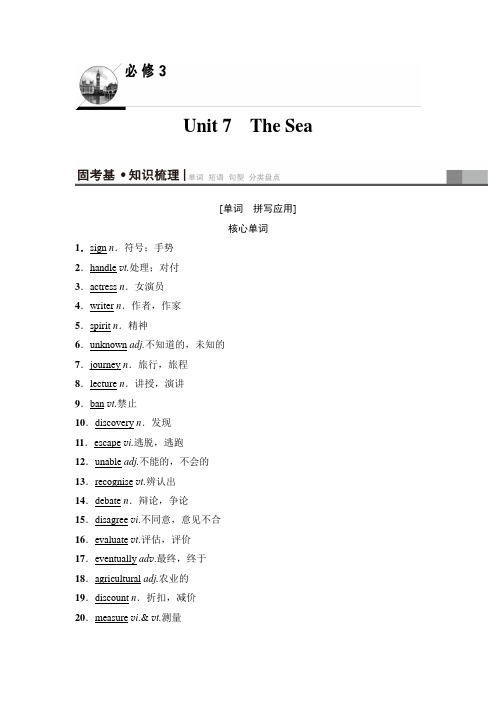
Unit 7The Sea[单词拼写应用]核心单词1.sign n.符号;手势2.handle v t.处理;对付3.actress n.女演员4.writer n.作者,作家5.spirit n.精神6.unknown adj.不知道的,未知的7.journey n.旅行,旅程8.lecture n.讲授,演讲9.ban v t.禁止10.discovery n.发现11.escape v i.逃脱,逃跑12.unable adj.不能的,不会的13.recognise v t.辨认出14.debate n.辩论,争论15.disagree v i.不同意,意见不合16.evaluate v t.评估,评价17.eventually ad v.最终,终于18.agricultural adj.农业的19.discount n.折扣,减价20.measure v i.&v t.测量[语境运用]用所给词的适当形式填空1.Staying in the quiet village is a way of escaping (escape)the city.2.There are signs (sign) that the number of the population in this area is increasing slightly.3.The problem will not be difficult to solve,if properly handled (handle).4.We measured (measure) the room and found it was 20 feet long and 15 feet wide. 5.Because of cheating,up to now Charlie has been banned (ban) from cycling for a year.6.The school has only been open for six months,so it's too early to evaluate (evaluate) its success.7.They debated (debate) for over an hour on the merits of different systems. 8.Researchers in this field have made some important new discoveries (discovery).拓展单词1.participate v i.参加→participation n.参加2.arrange v t.安排,准备→arrangement n.安排3.fright n.恐惧,害怕→frighten v t. (使)惊恐→frightened adj.害怕的;受惊的→frightening adj.令人惊恐的,骇人的4.explore v.勘探;探索→exploration n.勘探;探索;探究→explorer n.探险家→exploratory adj.探索的;探究的5.persuade v t.说服,劝服→persuasion n.说服→persuasive adj.有说服力的6.apology n.道歉→apologise v t.道歉7.pollute v t.使污染→pollution n.污染8.intelligence n.智力,理解力→intelligent adj.有才智的,理解力强的9.energy n.精力;活力→energetic adj.有活力的→energize v.使充满热情;使充满活力(精力)10.terrify v t.令人感到恐惧→terrifying adj.令人恐惧的→terrified adj.感到恐惧的11.survive v i.幸存,生存下来→survival n.幸存,残存→survivor n.幸存者[语境运用]用所给词的适当形式填空1.Luckily,I survived the terrible car crash last week and I was the only survivor of the accident.(survive)2.No matter whether he accepts my apology,I must apologize to him face to face.(apology)3.The child made a very intelligent comment,which showed that he was a boy of very high intelligence.(intelligent)4.As the river has been polluted, we should take measures to deal with the pollution.(pollute)5.We all participated in the camp and agreed that this participation was very valuable.(participate)6.What happened without any previous warning that day terrified all the passengers aboard the train.It was really a terrifying scene,and many people are still terrified at the thought of taking a highspeed train.(terrify)阅读词汇1.department n. 部,系,局,部门2.voyage n. 航海,航空3.ancestor n. 祖先,祖宗4.opposite n. 对立的人(物);反义词5.scream v i.尖声喊叫6.discount n. 折扣,减价7.leak v i.渗漏,泄漏8.windsurfing n.风帆冲浪9.coral n.珊瑚拓展联想1.“购物”词汇小聚①discount n.&v.打折②promotion n.促销③purchase n.&v.购买④retail n.零售⑤on sale廉价出售2.debate近义词全扫描①argue v.争论,争辩②discuss v.讨论,谈论③negotiate v.洽谈,协商④speak about/of谈论⑤talk over(反复)讨论3.“聪明的”词汇知多少①brilliant adj.卓越的②clever adj.聪明的③gifted/talented adj.有天赋的④intelligent adj.聪明的⑤smart adj.机灵的[短语多维运用]高频短语1.on one's own独自地;独立地2.according to根据,依照3.in search of寻找,寻求4.fill out填写5.deal with处理;对付[语境运用]选用左边短语的适当形式填空Last week,we had a party.Everyone had fun at the party,especially Mike.①According to Mike,he had a bottle of wine,but he insisted on driving home ②on his own.He went through his pockets ③in search of his key and made it.We persuaded him not to drink and drive and eventually let Tom drive him home.6.participate in参加7.set sail启航8.make it to到达9.get into trouble 陷入麻烦,陷入困境10.in addition to除……以外还有[语境运用]选用左边短语的适当形式填空Yesterday,I went to ④participate in an important match.Unfortunately,I ⑤got into trouble.⑥In addition to a heavy rain,I ran across a terrible traffic jam.You don't know what difficulty I had in ⑦making it to the destination.Luckily,I caught up with the match in time.11.all at once突然,忽然12.pick up取,接载;无意中学到13.make sense有道理,有意义14.make a living谋生15.watch out注意[语境运用]选用左边短语的适当形式填空We paid a visit to an old temple last week.When we were enjoying the beauty of the old temple,⑧all at once we heard a terrible scream.A boy about 5 years of age fell into a pool.I jumped into it immediately and rescued him successfully.I told him to⑨watch out for the pool next time.Although my clothes were wet through,what I did ⑩made sense.拓展联想1.含than的短语小聚①more than多于,非常②no more than仅仅③not more than不超过④less than少于,不太……⑤no less than至少,不少于2.make短语集锦①make a living谋生②make a fortune发财③make a mess弄糟④make a difference 有影响⑤make sense 有道理3.“除……之外”知多少①in addition to②except (for)③aside/apart from④besides⑤but (for)[句式 结构仿写]精讲10个考纲词汇1.participate vi.参加(1)单句语法填空①All the students are expected to participate(participate)in the event actively ,which can not only inspire your imagination but also offer you a stage to show yourselves.②Things will turn for the better if we can work out some participation(participate)rules for people to obey.③All the participants(participate)in the debate will have an opportunity to speak.(2)[链接写作]——词汇升级(普通表达)(2018·全国卷Ⅲ)Our school often holds football and basketball matches,and players from other schools often come to take part in them.(高级表达)Our school often holds football and basketball matches,and players from other schools often come to participate in them.先理解再牢记participate with sb.in sth.与某人分担……;同某人一起参与某事participate in sth./doing sth.参加[佳句背诵]From the earliest ages,they desire to help others,to share information and to participate in achieving common goals.2.arrange vt.筹备;安排;整理(1)单句语法填空①It's unnecessary for parents to arrange(arrange) everything for their children.②They arranged to leave(leave)the following spring.③The agency will make travel arrangements(arrangement) for you. Alternatively,you can organize your own transport.(2)[链接写作]——词汇升级(普通表达)We will prepare everything for you if you can join the team.(高级表达)We will make an arrangement for you if you can join the team.先理解再牢记(1)arrange sth.for sb. 为某人安排某事arrange to do sth. 安排做某事arrange for sb./sth.to do sth. 安排某人/某物做某事(2)make an arrangement/arrangements for 安排……[名师点津]①表示“安排某人做某事”用arrange for sb.to do sth.而不用arrange sb.to do sth.。
Unit 7 THE SEA Lesson 2 Protecting the Sea 教学设计2-优质公开课-北师大必修3精品

Unit 7 THE SEALesson 2 Protecting the Sea教学设计Teaching Objectives:1.To practice spoken English.2.To practice listening for specific information.3.To practice showing interest when listening to another speaker in a conversation.4.To practice involving the person who is listening to you.Teaching difficulties:Learn to involve the person who is listening to you.Teaching procedures:Ⅰ. Warming upT: How is the sea important to people?Ss: students’ answers may be various.T: Water covers about 75%of the earth’s surface, it provides us with food and resources such as oil, natural gas and some metals. Besides the sea has a great effect on climate, therefore.The sea is very important for us. But what we have done does harm to the sea.Now look at the pictures, showing students some slides about sea pollution. The teacher will ask some questions to encourage students to speak English.(The purpose is to produce the sea pollution and let students realize the importance of protecting the sea.)Ⅱ. Discussing1. You are likely to notice something about sea pollution in your city or hometown, pleasetalk about it.2. If we go on polluting the sea what is the result?3. What measures do you think we should take?4. What should we do as a student?(Courage them to make suggestions for preventing sea, river and lake pollution)Ⅲ. ListeningYour suggestions are good and useful and Fang Zhou and Zhi Hong are taking about the problem too. What will they say? Now let’s listen to the conversation(In order to help student better understanding the conversation first do the exercise).1. Listen to the tape and choose the right answer.①. What can be done about over fishing?A. man-made raising fishB. In the worst areas they ban fishing for several yearsC. control the number of fish people can catch②. What’s the result of over fishing?A. there are less fish to catchB. people can fish too muchC. They can catch more fish than before by better technology③. What are some government departments doing about sea pollution?A. punishing people who keep a record of levels of populationB. thinking of ways to reduce populationC. all departments must be responsible for finding where pollution comes from.(answers : ①. C ②. A ③. B )2. Listen to the tape again and fill in the tape.(The teacher design the exercise is to reducethe difficulty in next exercise )①. That’s when people fish too much and the number of fish falls too low. Some fish maydisappear altogether.②. So there are more fisherman catching more fish?Well, they hope to catch more fish, but there are less fish to catch, so they simply can’t.③. They also try to help people to get other kinds of jobs, so there are less people trying tomake a living from fishing.④. It mostly comes from industrial waste from factories and agricultural waste from farming.3. Listen to the interview again and answer the questions①.What is the problem 1?②. What is the problem 2?③. What are the reasons for problem 2?④. What are the causes of problem1?⑤. What are the solutions to problem 1?⑥. What are the solutions to problem 2?Ⅳ. Writing and speaking:Do exercise 5, 6, 7 to show interest and keep a conversation going. Read through the example dialogue then make up a new one with your partner.(The purpose is to practice showing interest when listening to another speaker in a conversation and involving the person who is listening to you.)Ⅴ. HomeworkPractice using the useful words about protecting the sea by making sentences with them: protect, pollute, pollution, waste, deal with, be responsible for, break the law, punish, keep a record of , control, communicate.。
高中英语:Unit7 The sea学案(北师大版必修3) 学案
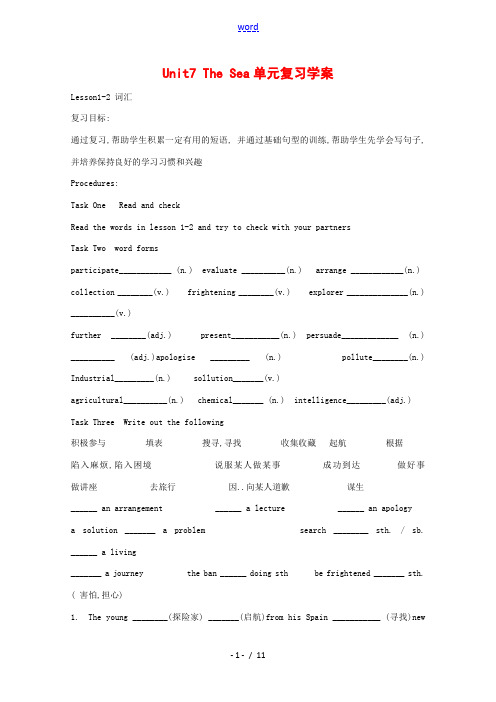
Unit7 The Sea单元复习学案Lesson1-2 词汇复习目标:通过复习,帮助学生积累一定有用的短语, 并通过基础句型的训练,帮助学生先学会写句子,并培养保持良好的学习习惯和兴趣Procedures:Task One Read and checkRead the words in lesson 1-2 and try to check with your partnersTask Two word formsparticipate____________ (n.) evaluate __________(n.) arrange ____________(n.)collection ________(v.) frightening ________(v.) explorer ______________(n.)__________(v.)further ________(adj.) present___________(n.) persuade_____________ (n.)__________ (adj.)apologise _________ (n.) pollute________(n.)Industrial_________(n.) sollution_______(v.)agricultural__________(n.) chemical_______ (n.) intelligence_________(adj.)Task Three Write out the following积极参与填表搜寻,寻找收集收藏起航根据陷入麻烦,陷入困境说服某人做某事成功到达做好事做讲座去旅行因..向某人道歉谋生______ an arrangement ______ a lecture ______ an apologya solution _______ a problem search ________ sth. / sb. ______ a living_______ a journey the ban ______ doing sth be frightened _______ sth.( 害怕,担心)1. The young ________(探险家) _______(启航)from his Spain ___________ (寻找)newland. He ______________(陷入麻烦) on his way, but he managed to _________(到达) an _______(know) island _________(最终) and named the island by his own name.2. Tom _________ (apology) to me because he forgot to inform me to _______(参加) the lecture _______ by Professor Chen yesterday.3. Those _________(参与)in the discussion e to the office after classplease.2. At the _________ sight of the snake he was so ________which _________everyone present here(害怕)3.I have walked 200 miles how much _______(远) should I walk ?4. With all the rivers _______(污染), we find nowhere to swim any moreTask Four Language in use1. 在他起航去美洲之前,他的队友早已成功到达了那里.2. 根据那些古老的传说,他犯了谋杀罪,因此有了麻烦.4. 在那次大会上,他向我们展示了解决那次争端(dispute)的办法.Lesson 1-2 课文复习复习目标:通过课文复习,掌握课文中重点词汇及句型,并能灵活运用写一篇保护环境的环保文章复习重点:Lesson1-2中重点词汇,句型复习难点:结合话题的书面写作Part One Summary回忆并归纳课文要点Lesson 1 shows us how Vikings arrived at AmericaIn the article the writer informed us stories how three people found Greenland and NewfoundlandLesson two mainly deals with the importance of protecting the sea by analyzing the problems and causes as well as the solutionsPart Two 重点词汇如果。
- 1、下载文档前请自行甄别文档内容的完整性,平台不提供额外的编辑、内容补充、找答案等附加服务。
- 2、"仅部分预览"的文档,不可在线预览部分如存在完整性等问题,可反馈申请退款(可完整预览的文档不适用该条件!)。
- 3、如文档侵犯您的权益,请联系客服反馈,我们会尽快为您处理(人工客服工作时间:9:00-18:30)。
Lesson 1 The Spirit of Explorers(&Warm-up)
教材分析(The Analysis of the Teaching Materials):
本课是第七单元的第1课,是一篇阅读课。
通过一篇有关于维京人如何发现北美大陆的文章,让学生们温习,了解有关于维京人当时生活状态和探险经历的历史知识,感受和学习探险者的精神。
本课旨在培养学生在文章中获取细节信息的阅读能力。
本课语法是由where, when, why等关系副词引导的定语从句以及介词加which,whom等的定语从句。
因为在上学期的第六单元,学生们已经学习了由who,whom,whose,which,that引导的定语从句,对定语从句的特点,用法有了一定的了解,这为本课进一步学习定语从句奠定了基础。
本课要求学生能为定语从句选择恰当的引导词并能在语境中应用定语从句。
本课计划按两个课时完成,第一课时的重点是完成阅读文章,学生要学习课文种出现的新单词,练习从文章中提取细节信息的能力,并能够根据文章中的信息简述早期维京人航海的有关情况;第二课时学习由where,when,why引导的定语从句以及由介词加which,whom的定语从句,从识别关系词到选择关系词,最后要求学生能自己使用恰当的关系词来组成定语从句,并在语境中应用。
教学内容(Teaching Content)
话题:探险家的精神(阅读)
重点词汇:frightening, spirit, explorer, sailor, voyage, deed, journey, present-day, eventually, further, set sail, according to, get into trouble, in search of , persuade sb. To do sth.
相关词汇:water-skiing, windsurfing, underwater
语法:由where,when,why等关系副词引导的定语从句以及介词加which,whom 等的定语从句。
Teaching Aims:
1. To practise reading for specific information.
2.To practise using relative clauses with when, where and why.
3.To practise using relative clauses with prepositions and relative pronouns.
4.To review and consolidate the relative pronouns.
5.To talk about explorers.
Teaching difficulties:
To practise using relative clauses with when, where and why.
Teaching Aids: computer and cassette.
教学过程(Teaching Procedures)
第一课时
Part One Warm-up
Step 1.To ask students to listen and identify the pictures of the sea.(通过声音和图片将学生引入场景,激活学生的思维)
Step 2 Students do exercise 2 on page 7,and brainstorming the sea activities.(激活学生已经学习过的词汇并引出相关的新词)
Step 3 Students listen to four people who are talking about their activities ,focusing on the activities at the first time and on the adjectives at the second time.(让学生感知海上运动,使用依据关键词判断谈话内容的听力策略,体会形容词的用法) Part Two Lesson 1
Step 1 Ask students to discuss who arrived in America first,and teacher introduces the basic information about the Vikings.Students learn to pronounce the place names. (渗透地理和历史知识,为了阅读理解提供清晰的思路)
Step 2 First reading:ask students to skim the text and match the headings with the paragraghs.(学生了解课文的整体结构,了解大意,便于随后的细节阅读)
Step 3 Second reading:students read the text again and sequence the events of the discoveries.(以时间为线索把事件按照顺序排列起来,理清文章的思路)
Step 4 Third reading:students read the text and find out "when" and "who" information about the discoveries .And students read the text carefully and get more detailed information by completing the table.(将主要事件的信息由浅入深的分步骤提取和整理,为随后的简述准备信息)
Step 5 Help students understand the meaning of some key words.(在语境种加深对词义的理解)
Step 6 Ask students to work in pairs, asking and answering questions about the three discoveries based on the information in the table.(对课文的主要信息进行内化,为个人的表达做准备)
Step 7 Invite a few students to introduce one part of the Vikings' discoveries.(检查本课的教学目标是不是落实)
Step 8 Homework .
教学反思(Assessment)。
